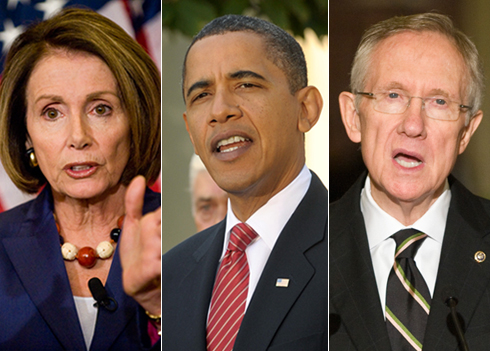The nine lives of the public option seem to have run out. Last week, Democratic leaders in Congress twisted themselves into pretzels to explain to angry progressives why the popular measure will not make the cut when they fix the Senate health care bill in the reconciliation process. And the leadership vacuum, combined with insufficient enthusiasm for the plan among rank and file Democrats seem to have sealed the deal this time.
House Speaker Nancy Pelosi and the White House place the demise of the public option at the feet of the Senate: There aren’t the votes in the Senate, they say. But that’s anything but obvious. In the past year, the number of Senators who’ve gone on the record in support of the public option well exceeds 50. In recent weeks, over 40 have restated their support for it and 24 have signed a letter expressly stating they would vote for it if it was included in the reconciliation package. And last week Senate Majority Whip Dick Durbin said he’d run a strong whip in favor of the public option if the House sends over a reconciliation bill with a public option in it.
But if Pelosi doesn’t take the initiative–and she’s said she won’t–it’s game over. If a single senator–such as Bernie Sanders (I-VT)–tries to add a public option to the reconciliation bill during the amendment process, Durbin says he’ll whip against it. Why he’d need to whip against something that doesn’t have the votes to begin with is a question that nobody can seem to answer. But what we’re left with is a familiar pattern–one that has emerged just about every time the public option has been on the ropes.
No leading Democrat–not Pelosi, not Senate Majority Leader Harry Reid, not President Obama–wants to be the villain who killed the public option. And yet none of them has a compelling explanation for why they’re not using the reconciliation process–immune from the filibuster–as an opportunity to push for the plan. So we’re left with buck passing and confusion.
And yet, enthusiasm for the public option among Democrats isn’t so feverish that leaders have no choice but to take it seriously. Long gone are the days when members threatened to kill the entire reform push over the public option, and many of the public option’s supporters aren’t particularly enthusiastic ones. Rank and file support is strong, but not strong enough to push leadership’s hand.
So what’s going on? Why is the public option flagging?
The vote tally in the Senate is close, and it seems perfectly plausible that with a bit of pressure from leadership, it would prevail. Here’s a new ad from the public option advocates at the groups Progressive Change Campaign Committee, Credo Action, and Democracy for America making that point.
In the House, things are less clear. On the one hand, leading Democrats say they could still pass a public option in the House. Majority Leader Steny Hoyer has said as much. And Rep. Rob Andrews (D-NJ)–who chairs a key health subcommittee–told me he thinks a public option would make passing health care reform easier in the House. In fact, the House passed a public option as part of its base health care bill in November. But at the same time Hoyer and Pelosi may have lost some support among pro-life Democrats and squeamish freshmen, and are busily seeking to make up those votes among members who oppose the public option–so it stands to reason that they don’t want to scare them off.
And then there’s a third explanation, or theory–advanced by Obama’s progressive critics–which holds that the public option, like prescription drug re-importation and other popular measures, were dealt away by the White House early in the process to secure the support of major industry players. A New York Times article from last August hints at the possibility of such a deal, but contains no smoking gun.
And so, for the time being, the public option’s real cause of death remains unknown.










